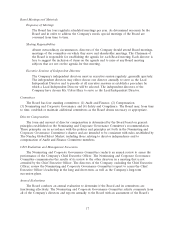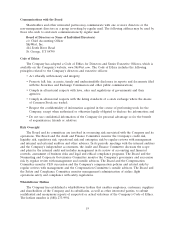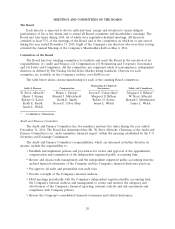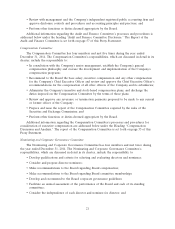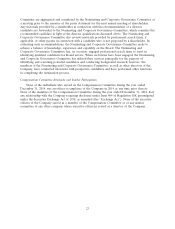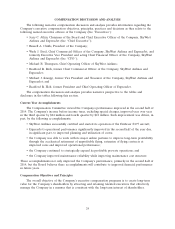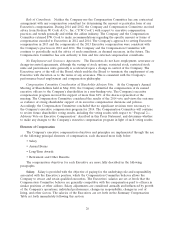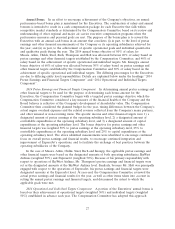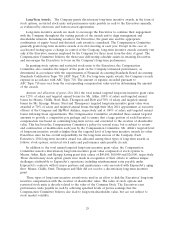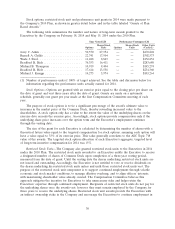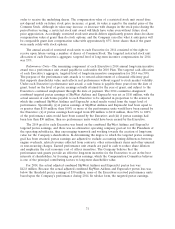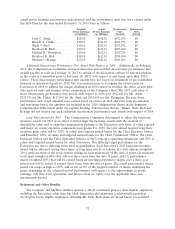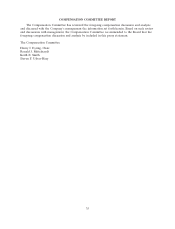SkyWest Airlines 2014 Annual Report Download - page 142
Download and view the complete annual report
Please find page 142 of the 2014 SkyWest Airlines annual report below. You can navigate through the pages in the report by either clicking on the pages listed below, or by using the keyword search tool below to find specific information within the annual report.Accordingly, the executive compensation program incorporates the following principles:
• The overall compensation package should encourage long-term focus and shareholder value
creation.
• Compensation should be competitive with other airlines in order to attract and retain talented
executives.
• Compensation should be based upon individual responsibility, leadership ability and experience.
• Compensation should reflect the fair market value of the services received.
• A significant amount of total compensation should be incentive based, and should correlate to
the Company’s financial performance, as well as the achievement of operational and individual
goals.
• Compensation should not encourage the taking of undue, material risk.
Executive Compensation Procedures
To attain the Company’s executive compensation objectives and to implement the underlying
compensation principles, the Company follows the following procedures:
Role of the Committee. The Compensation Committee has responsibility for establishing and
monitoring the executive compensation programs and for making decisions regarding executive
compensation. The Chief Executive regularly attends the Compensation Committee meetings. The
Compensation Committee also meets regularly in executive sessions. The Compensation Committee
recommends the compensation package of the Chief Executive to the Board, which then sets his
compensation. The Compensation Committee also considers the recommendations of the Chief
Executive with respect to compensation of the other Executives, and after reviewing such
recommendations, sets their compensation. The Compensation Committee also monitors, administers
and approves awards under the various incentive compensation plans for all levels within the Company,
including awards under the Company’s annual bonus plan and the Company’s 2006 Long-Term
Incentive Plan and 2010 Long-Term Incentive Plan (the ‘‘2010 Plan’’).
The Compensation Committee relies on its judgment in making compensation decisions in addition
to reviewing relevant information and results. When setting total compensation for each of the
Executives, the Compensation Committee reviews tally sheets which show the Executive’s current
compensation, including base pay, annual bonus objectives, long-term, equity-based compensation
objectives, and deferred compensation retirement funding. The Compensation Committee has the sole
discretion to award compensation and make adjustments to awards based on the Compensation
Committee’s review of relevant information and other unusual.
The Compensation Committee also occasionally evaluates surveys and other available data
regarding the executive compensation programs of other regional and major air carriers in order to
determine competitiveness of the Company’s executive compensation programs. The Compensation
Committee performed such a review in 2012 that included a review of the executive compensation
practices of peer transportation companies Southwest, Avis Budget Gp, Ryder System, UTi Worldwide,
JetBlue, Alaska Air Group, Swift Transportation, Hub Group, Republic Airways, Arkansas Best,
Hawaiian Holdings, Pacer Intl, Atlas Air, and Spirit Airlines. In 2014, the Compensation Committee
did not perform or rely upon any updated review of peer company compensation practices or any
updated surveys of peer compensation, but did take into account the results of the 2012 review. The
executive compensation procedures and the Compensation Committee assessment process are designed
to be flexible in an effort to promptly respond to the evolving business environment and individual
circumstances.
25




